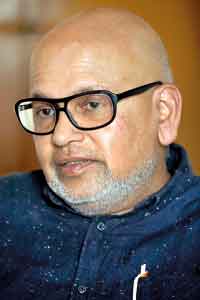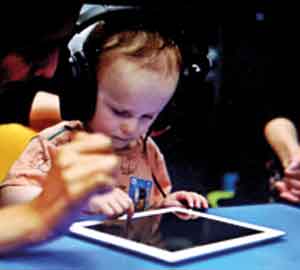Let’s play a game to detect hearing impairment

Dr. Jaika Witana
It was of an evening nearly 10 years ago in their home in Birmingham, England, that he saw his 14-year-old daughter, Apsara, engrossed in a Pac-Man game with its beeping response as she played it on her computer.
In his mind, a light bulb clicked on and he made a small note for future reference. This is what has now blossomed into an invention which will help millions of little ones across the world.
An Automated Paediatric Audiometer which has paved the way for early detection of impairment or loss of hearing which, in turn, will help in early intervention and therapy.
The inventor-cum-doctor is Audiovestibular Physician Dr. Jaika Witana who is now based at the Alder Hey Children’s Hospital in Liverpool.
“Feasibility studies of the Automated Paediatric Audiometer on 30 children between the ages of 2½ and 8 years were completed last year and the prototype by me and Michael Power based on a laptop and an iPad has been built,” he says.
With the ‘audiovestibular medicine’ term being coined by Dr. Witana himself when this niche specialty was known as ‘audio and audiological medicine’, he explains that these are doctors who investigate, diagnose and manage hearing, balance and communication disorders.
He does so with children from birth and his simple notes of 2008 came to mind when there were referrals. Explaining that usually in the developed world there is universal neonatal hearing screening, Dr. Witana points out that in developing countries though those who are targeted for such screening are only children in Intensive Care Units (ICUs) in hospitals, if parents or teachers have suspicions or fears that the child may be hearing impaired or there is a family history of hearing issues. “Unfortunately 50% of babies with hearing impairment can be missed.”

The Automated Paediatric Audiometer is useful in testing very young children
If hearing impairment is identified early, there are interventions such as hearing aids and in the case of profound hearing loss, cochlear implantation. This is why early detection is crucial. Otherwise, identification follows much later when parents or professionals raise concerns on speech and language development delays in the child, he says.
The Automated Paediatric Audiometer is useful in testing very young children and due to its image-using play is handy even with children with autism or attention deficit hyperactivity disorder (ADHD). This will enable doctors to rule out a hearing disorder in these children.
How do you check the hearing of little ones who may cry, not stay still for a moment, fidget, freak out or run around in an unfamiliar and strange environment that is the acoustic test booth?
Dr. Witana’s answer is: Let’s play a game.
Handing over an iPad to the child, he/she would be fitted with head-phones and the colourful and thrilling game begins………in one game, the child would have to blast a rocket as soon as there is a beep, with the ‘reward’ being the explosion of the rocket and in another the child would move through an orchard picking apples. An apple would fall into the basket as the ‘reward’ when the child hears the beep and presses the button.
The beeps, of course, will be the sound frequencies which the child responds to and bring forth a ‘pure-tone audiogram’ (PTA) which plots the child’s hearing as a graph on the audiologist’s laptop screen. Hearing is measured in logarithmic decibels at frequencies between 125 Hz (low-pitch sounds) and 8000 Hz (high-pitch sounds).
We get a brief explanation on the ‘Witana-Power Algorithm’ on which this computer programme, containing a series of games has been created. In mathematics and computer science, an ‘algorithm’ performs calculations, data-processing and automated reasoning tasks.
This game-algorithm based on artificial intelligence (AI) is created in such a way that both ears of the child will receive different sound frequencies, in a randomized way. It will choose to which ear to target the sound.
Referring to the ‘reward and punishment’ method used in this Automated Paediatric Audiometer, he says this is the psychological concept of ‘operant conditioning’ also referred to as instrumental conditioning. It makes an association between a certain behaviour and a consequence of that behaviour and gives rewards or punishments. “To win a game the child must give the correct response.”
Contrasting this method with the older linear system, he says that it has ‘forced choice’ with negative reinforcement. In that the child’s space-ship would shake violently if the press of the button is at the wrong time when there is no beep, but in his algorithm incorrect button-pressing, would result in the child’s space-ship being shot down.
Before the advent of his invention, usually when taking a child’s PTA, two personnel would be needed, one to be with the child and play with him/her with wooden or plastic toys and the other to manually plot the chart. With his audiometer only one audiologist is needed as the child would be engrossed in play and the PTA would be displayed on the other screen.
The bigger advantage is the accuracy of the Automated Paediatric Audiometer as against the manual or semi-automated audiometer, he stresses, adding that the size of the equipment has also reduced considerably. In the 1940s, they were cumbersome, with a child being told to put large wooden toys into a basket when there is a beep. Even now, the older audiometers are big desktops.
Meanwhile, a multi-centre study with 10 other institutions is on the cards “fairly soon” for the Automated Paediatric Audiometer, with Dr. Witana adding that his invention not only has technology innovation but also behavioural psychology innovation.
| Helping children in Sri Lanka | |
| Dr. Jaika Witana has not forgotten the children in the land of his birth, childhood and youth. “My vision is to bequeath the audiometer system to Sri Lanka’s Health Ministry, so it could be ‘rolled out’ to screen the hearing of all pre-schoolers and primary schoolchildren,” he says. He hopes to introduce the concept through animated stories which parents can either read to their children or show them on video so that the children would be familiar with the characters. Eager to undertake a ‘whole population screen’ as a public health study, he says it will be “unique” in healthcare and health screening. “In terms of the logistics of testing, Sri Lanka’s relatively small population with a high literacy rate would be ideal,” adds Dr. Witana. |


